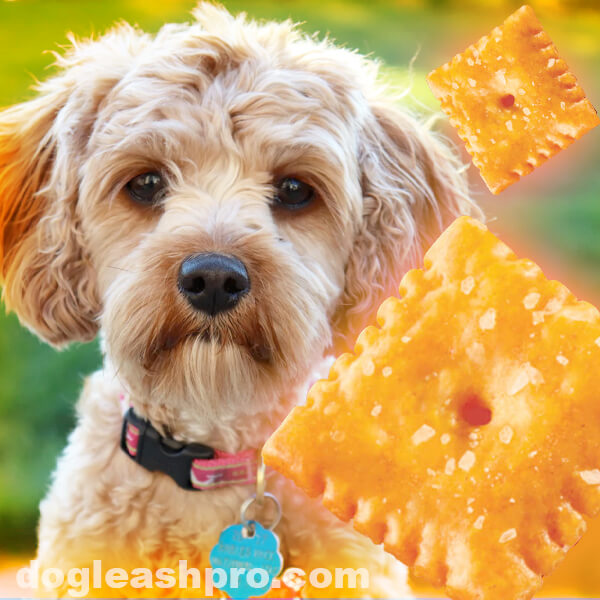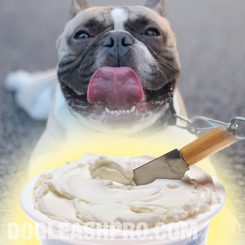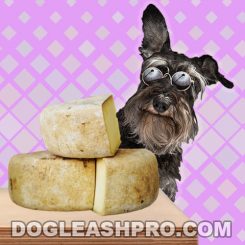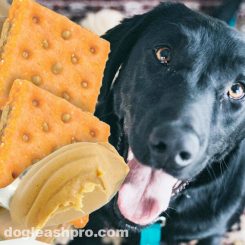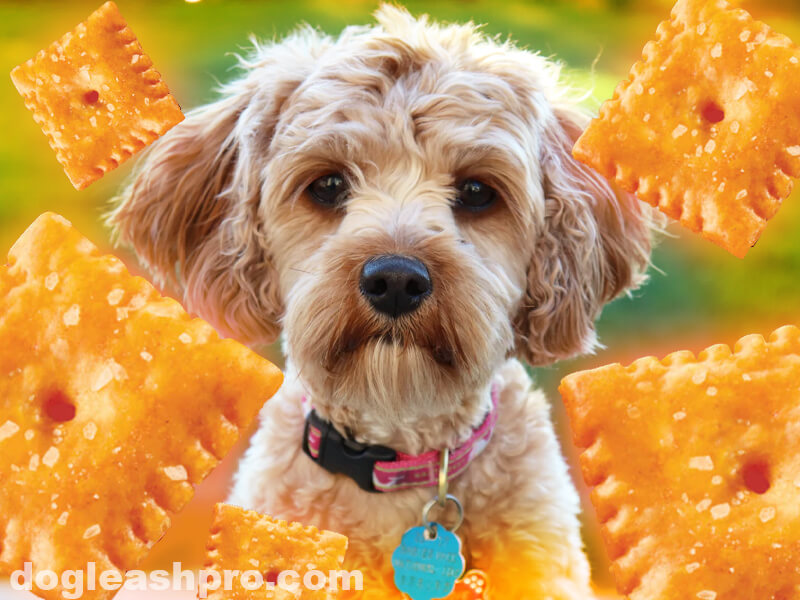
I came home yesterday to find several bags of Cheez Its scattered all over my kitchen floor. The plastic bags were all chewed up and the Cheez Its crackers were nowhere to be found. I did find my Labrador’s guilty face when I asked her about it. At first, I was horrified but it was my fault for leaving them on the kitchen counter before I left for work. I’ve been eating Saltine Crackers for weeks and wanted to switch it up a bit.
Can Dogs Eat Cheez Its? Dogs should not eat Cheez Its because they are high in salt, fats, and calories. All of these can contribute to various health problems in dogs such as heart problems, high cholesterol levels, and obesity. If you must, we recommend you give your pooch one Cheez It cracker occasionally, depending on his or her size.
Table of Contents
Can dogs have Cheez Its?
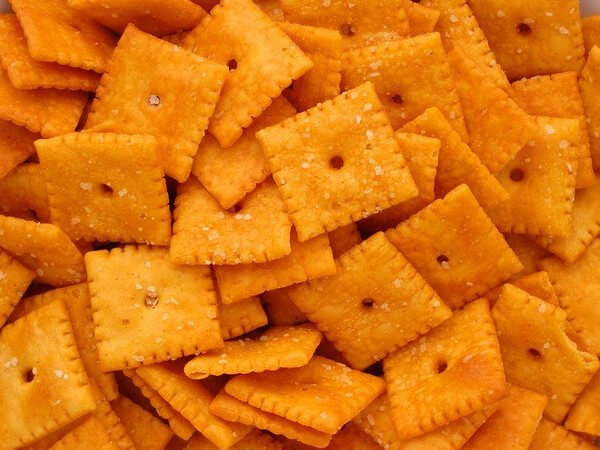
Dogs should not have Cheez Its because these cheese crackers are not healthy for dogs. They are loaded with calories so this would only increase your dog’s daily calorie intake without providing any nutritional value, therefore, we consider Cheez Its to be an empty calorie food for our pooch.
Empty calorie snacks or food contributes to weight gain and health problems in our canine friends.
To fully understand why dogs should not have Cheez Its, let’s take a look at the ingredients in these cheese crackers:
Cheez Its ingredients
Here are the main ingredients in Cheez Its:
- Enriched flour made of wheat flour, niacin, reduced iron, vitamin B1 (thiamin mononitrate), vitamin B2 (riboflavin), and folic acid.
- Vegetable oil from high oleic soybean, soybean, palm, and/or canola oil with TBHQ for freshness.
- Cheese made with skim milk and includes skim milk, whey protein, salt, cheese cultures, enzymes, and annatto extract color.
Each Cheez Its cracker contains 2% or less of the following:
- Salt.
- Paprika.
- Yeast.
- Paprika extract color.
- Soy lecithin.
Based on these ingredients alone, we can confidently say that Cheez Its is a snack that was made for humans to consume and not for our furry friends.
Let’s go over these ingredients individually and find out why:
Enriched flour is not good for dogs that are allergic to wheat
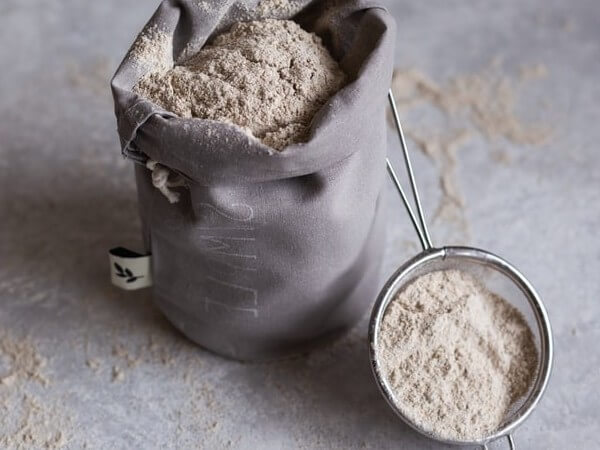
Enriched flour is the main ingredient in Cheez Its and it is made from wheat flour. If your canine companions have a wheat allergy, be sure to avoid feeding them Cheez Its. If you’re not sure if your pups have wheat allergies, we advise that you give them a tiny amount of Cheez Its first and see if they react to it.
Signs of wheat allergy include:
- Flaky, dry, and itchy skin.
- Frequently licking their skin causes their hair or coat to fall off.
- Many bald spots throughout the body.
- Red or inflamed paw pads due to frequent licking of the paws.
- Skin is sunburned because they don’t have enough hair to protect their skin.
- Gastrointestinal upset.
- Upset stomach.
If you spot any of the above symptoms in your K9 pups right after eating food that contains wheat products, then they may potentially be allergic to wheat. We recommend that you consult with your vet or bring your furry pals in for a checkup to confirm whether your K9 friends have wheat allergies.
While you and your pups are there at the veterinary clinic, ask your vet if switching to food made with Amaranth flour might be a better option for your furry friends because it contains many of the natural minerals and all the essential amino acids that your dogs need. Amaranth is also full of protein as well.
Keep in mind that the enriched flour is highly processed and during the wheat to flour processing, many of the natural nutrients were lost. To retain the nutrients that were lost, the following were artificially added back in:
- Reduced iron.
- Niacin (Vitamin B3).
- Thiamin mononitrate (Vitamin B1).
- Riboflavin (vitamin B2).
- Folic acid (Vitamin B9).
Although the wheat flour contains iron and B vitamins, your furry friends are better off receiving these vitamins and iron from their main meals or dog-friendly snacks and treats. Therefore, avoid giving them Cheez Its.
Vegetable oil containing soybean and TBHQ is harmful to dogs with soy allergy
We advise against feeding your furry pals Cheez Its and here is another reason why:
The vegetable oil used to make Cheez Its contains the following:
High oleic soybean
High oleic soybean means that the oil contains more monounsaturated fatty acid, specifically omega-9 fatty acid, than the typical soybean oil. Omega 9 fatty acid can help with your dog’s skin and heart health as well as their immune system.
However, we recommend that your pooch receive monounsaturated fatty acid or omega-9 fatty acid from fish oil instead and not from Cheez Its.
Whether it is high oleic soybean or regular soybean oil, both are harmful to dogs with soybean allergies. If you suspect your K9 has a soybean allergy or you spot any of the symptoms below, please avoid feeding them Cheez Its:
- Frequently scratching at the ears or shaking the head due to ear canal infections.
- Yeast or bacterial infection in the ear.
- An annoying sensation that causes your dogs to itch and scratch themselves. This is known as pruritus.
- Hair loss from frequently licking the skin.
- Discharge of skin oil.
- Diarrhea.
- Vomiting.
- Eyelid inflammation or blepharitis.
- Skin infection with pus formation which requires antibiotics.
The best types of oil for our furry family members include fish oil, coconut oil, olive oil, sunflower oil, and flaxseed oil.
Palm or canola oil are both not recommended for our K9s. Additionally, you’ll notice from the ingredient list that the canola oil has TBHQ for freshness.
If you’re wondering what TBHQ is, it stands for tertiary butylhydroquinone. At first glance, this is a chemical that is definitely very hard to pronounce. There’s a general rule when it comes to food and that is if you can’t pronounce the ingredients, it’s probably not good.
That is especially true in this case. TBHQ is actually a preservative that is harmful to our canine companions. As the ingredient says, the TBHQ is to help keep the canola oil in the Cheez Its fresh. Thus, it really does not provide any nutritional value to our pups.
Instead, TBHQ can damage our dog’s DNA and cause cancer in their stomachs. This means that this preservative is detrimental to our dog’s health.
After seeing the TBHQ and finding out what it does to our doggy’s health, it was enough for me to stop feeding my two K9 buddies Cheez Its. Say bye to Cheez Its!
Warning: One of the many harmful ingredients in Peanut Butter crackers is soybean oil with TBHQ for freshness. Check out Can Dogs Eat Peanut Butter Crackers to find out what other ingredients in that snack are dangerous to our dogs.
Cheese made with skim milk is harmful to dogs that are lactose-intolerant
Although skim milk has fewer calories and protein than regular milk, it is still a dairy product. So if your pooch is lactose-intolerant, he will not be able to digest skim milk properly. This is because most dogs lack the lactase enzyme that helps to break down the lactose in milk.
Lactose is basically the natural sugar found in milk.
The same goes for cheese. Cheese also contains fats and sugar that most dogs’ bodies can not digest properly because they lack the necessary enzymes to break down this dairy product.
If you know your canine friend is allergic to dairy products, whether it is milk or cheese, avoid feeding them Cheez Its.
Whey protein should not be fed to our pooch just yet
There hasn’t been much research done on whey protein for dogs. However, since we know that whey protein was made for human consumption, it’s safe to say that we should not feed our pooch whey protein just yet.
Additionally, whey protein is from cheese so if your pups are lactose-intolerant, it is not a good idea to feed them food that contains whey protein.
Too much Salt intake is harmful to dogs
In just 1 Cheez Its cracker, there is 9 mg of salt. While this isn’t much for humans, it is considered too much salt consumption for our canine friends. That’s because our furry pooch only requires just 0.25 grams to 1.5 grams of salt for every 100 grams of their food.
Dogs will generally meet this daily salt intake from their regular diet or dog food. Any amount of salt after that is considered excessive salt intake for dogs. Eating more than 3 Cheez Its crackers can easily tip over their daily salt intake amount and lead to sodium poisoning in dogs.
Signs and symptoms of sodium poisoning in dogs include:
- Extreme thirst leading to frequent urination.
- Headache.
- Swollen tongue.
- Nausea.
- Vomiting.
- Upset stomach.
- Watery diarrhea.
- Loss of appetite.
- Fluid buildup.
- Convulsions.
- Breathing difficulty.
- Fever.
- Confusion.
- Tachycardia or increased heart rate.
- Muscle spasms.
- Body weakness.
- Lethargy.
Related Article: My Dog Is Acting Drunk And Wobbly (Should I Be Concerned?)
If you suspect that your pooch has sodium poisoning, we highly recommend that you contact your dog’s vet as soon as possible. Your vet may ask that you bring your furry friend in for a thorough and complete physical exam.
There, the vet will check your dog’s blood pressure, temperature, reflexes, respiration, pulse rate, and find out how high the sodium level is in his body. The vet will also perform a hearing and vision test.
If you know how many Cheez Its your furry friend ate and how long ago they ate the Cheez Its, you’ll want to let the vet know this information.
Your vet will also perform the following tests to find out the sodium level in your dog’s body.
- Blood gases.
- Complete blood count.
- Blood chemistry.
- Urinalysis.
- Cardiac exam (ultrasound, X-ray, EKG, CT scan, MRI).
Depending on how severe the sodium poisoning is, your vet may have to administer IV fluid therapy, oxygen, and electrolytes to keep your Fido hydrated.
It’s important to note that your four-legged friend may have to stay at the hospital overnight, if not for a few days. That’s because it’s dangerous to bring the salt level down suddenly or quickly as this may cause brain swelling (cerebral edema) or even a heart attack.
Depending on how high the sodium levels are, it could likely take up to three or four days for the sodium level to come down to an acceptable level.
Annatto extract color can cause seizures in some dogs
Annatto is an additive and vegetable dye that is added to Cheez Its to gives the crackers their signature cheese and orange color. Be careful when feeding food or snacks with annatto coloring because it has been shown to cause seizures in some dogs.
If the cheese is orange or bright yellow in color, there is a high chance that annatto coloring was added. For this reason, we highly recommend that dog owners avoid feeding their pooch Cheez Its.
Handy Hint: Most snacks that contain cheddar cheese, like the crunchy Goldfish crackers, will use a vegetable dye called annatto to give the crackers their bright orange or yellow color. Annatto is harmful to our furry friends and provides no nutritional value.
Paprika is fine but can cause stomach issues in dogs
Paprika is a spice and although it is not toxic to dogs and won’t cause severe harm, we highly advise against feeding your pooch food or snacks with paprika in them.
Paprika can cause diarrhea, vomiting, throat irritation, upset stomach, and gastrointestinal upset in dogs.
Avoid feeding your pooch food that contains paprika frequently because doing so can cause your dog to develop gastritis.
There are some benefits from eating paprika for dogs such as receiving Vitamin A for good eye health, Vitamin E for skin health, and antioxidants for great overall health. However, all of these essential vitamins can be found in canine-friendly dog food or snacks such as carrots, pumpkins, or red bell pepper.
Yeast is toxic to dogs in its raw form
Since the yeast in Cheez Its is not in its raw form, it is fine for dogs, but it is not something our dogs need. Be careful if the yeast is in its raw form. Let’s find out why:
When yeast is raw, then it is toxic to dogs. We recommend that dog owners place their bread dough that contains raw yeast on a high kitchen counter or on a high shelf where your K9 friends can’t reach it.
That’s because it is very dangerous, if not harmful, for dogs to eat that bread dough that contains raw yeast. When raw yeast enters the dog’s stomach, it will expand because the dog’s warm stomach is the perfect temperature for the yeast to expand and continue rising.
When this happens, it can cause blockage in your dog’s stomach and lead to Gastric Dilatation Volvulusyeast (GDV) or bloating. Yeast can also lead to alcohol poisoning in dogs.
Soy lecithin is dangerous to dogs with soy allergies
As the name of the ingredient suggests, it contains soy so if your pooch is allergic to soy products, then Cheez Its is a no-no snack for your pup. Our canine friends’ liver produces enough lecithin for their bodies so they don’t need this from food.
Your furry friend can also receive lecithin from healthier food options such as chicken liver, cauliflower, Brussel Sprouts, and eggs instead of Cheez Its.
Are Cheez Its bad for dogs?
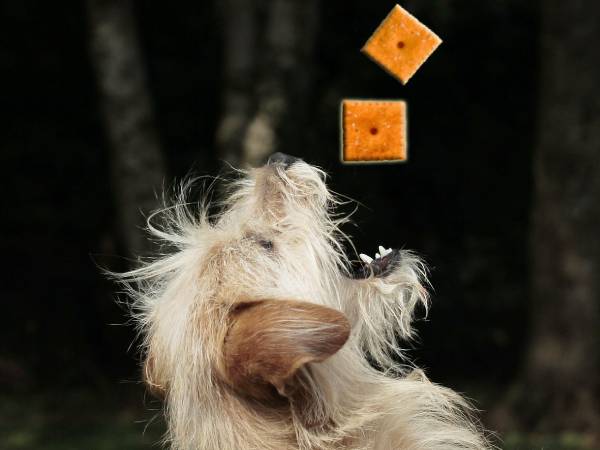
As you can see, Cheez Its is bad for dogs. There are more harmful ingredients than good ones in these crispy cheese crackers.
Let’s also take a look at the nutritional profile of one Cheez Its cracker to fully understand why pet owners should not allow their dogs to eat Cheez Its.
Cheez Its nutrition label
Nutritional profile of Cheez Its (One Cheez Its Cracker)
| Name, Unit | Amount |
| Calories, cal | 6 |
| Total Fat, g | 0.3 |
| Saturated Fat, g | < 0.1 |
| Polyunsaturated Fat, g | 0.1 |
| Monounsaturated Fat, g | < 0.1 |
| Sodium, mg | 9 |
| Total Carbohydrate, g | 0.6 |
| Dietary Fiber, g | < 0.1 |
| Protein, g | 0.1 |
| Calcium, mg | < 1 |
| Potassium, mg | 1 |
| Iron, mg | < 1 |
This means a single cracker of Cheez Its has 6 calories, 0.3 grams of fat (about 0.1 grams saturated), and 0.6 grams of carbohydrates.
With one Cheez Its cracker providing 6 calories, that is a lot for our furry family members. It’s important to keep in mind the 90/10 rule when feeding snacks or treats to our pups.
90% of your dog’s calories should come from a wholesome complete diet while only 10% of their calories should come from treats.
If we have two dogs, one small and one medium, let’s see how eating Cheez Its can affect their calorie intake.
- A small Chihuahua dog weighing 10 pounds should only have 250 calories per day.
- A medium Labrador dog weighing 55 pounds should only have 1,375 calories per day.
This means that one Cheez Its cracker would already take up 2.4% of the total 10% calorie intake from treats. If your small Chihuahua dog accidentally eats three Cheez Its crackers, then it would take up 6.8% or almost 10% of the calorie intake reserved for treats.
This shows us that Cheez Its crackers are harmful to small dog breeds because they do not provide much nutritional value to our dogs, yet they are full of empty calories that can cause weight gain in dogs. Regularly allowing your pooch to eat Cheez Its can lead to canine obesity and even acute pancreatitis in severe cases.
There are many health issues that can lead to acute pancreatitis including:
- High-fat diets.
- Obesity.
- Toxins.
- Hypothyroidism.
- Various medications.
So, can dogs eat Cheez Its?
Absolutely not. If you must, only feed your pooch one or two Cheez Its occasionally. Regularly feeding your canine family member Cheez Its can cause a variety of health issues, which we don’t want.
When it comes to our dog’s health, it’s important to track what they eat because food can affect their gut health, which affects their mental and physical health. If you’re like me, we want our dogs to live long fulfilling lives, and eating the right healthy food is one of the ways to provide them that.
Cheez Its are made for human consumption so let’s not feed this human snack to our precious pups.
Related Questions
No, dogs should not eat white cheddar Cheez Its. White cheddar Cheez Its contains more harmful ingredients to our canine friends than the original Cheez Its.
If we thought the original Cheez Its is bad for our pups, then white cheddar Cheez Its is even worst. For example, white cheddar Cheez Its uses the same ingredients as the original Cheez Its with additional harmful ingredients like monosodium glutamate, butter, baking soda, artificial flavor, and citric acid to name a few.
No, a dog should not Cheez Its because it is high in calories, salt, and fats. It also contains harmful ingredients that our canine friends should not have such as salt, annatto extract color, soy lecithin, and vegetable oil that contains TBHQ for freshness.
If your pooch is allergic to wheat or soy, please avoid feeding them Cheez Its as well.
No, dogs should not eat Cheez Its. One Cheez Its cracker already has 6 calories and 9 mg of salt. While that is not a lot for humans, it is definitely too much for dogs. Excessive salt intake can also lead to sodium ion poisoning in dogs.
If you must, you can give your dog one Cheez Its cracker. One Cheez Its cracker already contains 9 mg of salt and 6 calories. That is a lot for our canine friends. Regularly eating Cheez Its can cause canine obesity and in severe cases even pancreatitis. We recommend that dog owners avoid feeding their pooch Cheez Its.
DISCLAIMER: THIS WEBSITE DOES NOT PROVIDE MEDICAL ADVICE
The information, including but not limited to, text, graphics, images and other material contained on this website are for informational purposes only. No material on this site is intended to be a substitute for professional veterinary advice, diagnosis, or treatment. Always seek the advice of your veterinarian or other qualified health care provider with any questions you may have regarding dietary needs.
CHEEZ-IT is a registered trademark of Kellogg North America Company. Dogleashpro does not claim any ownership of the CHEEZ-IT name, logo, or any identifying mark in any way. This article is for educational purposes only.
Resources:
https://en.wikipedia.org/wiki/Cheez-It
https://www.snackhistory.com/cheezit

With over five years of specialized experience as an animal writer, my expertise lies in dog nutrition, health, behavior, grooming, and training. I am dedicated to delivering helpful and informative content that caters to the well-being of our furry friends. My primary goal is to empower pet owners with knowledge and ensure our canine companions thrive in health and happiness. In my free time, I love volunteering at local dog rescue centers.
